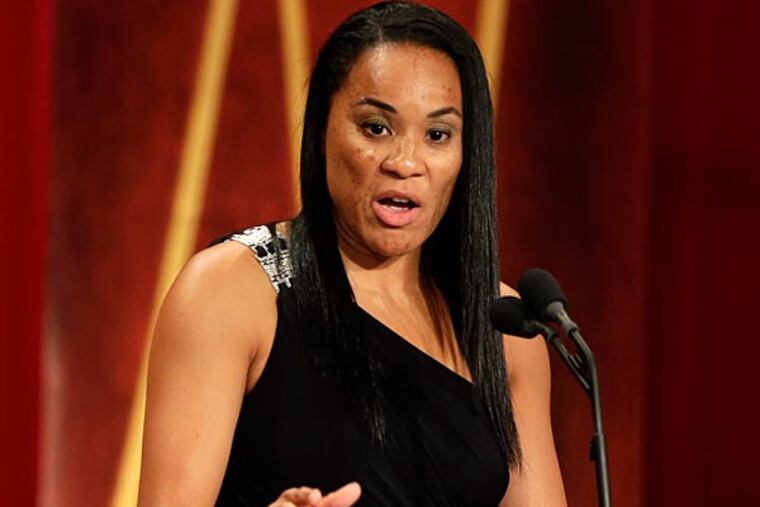Coaching grows on former star player Staley
Women's basketball star Dawn Staley never envisioned herself as a coach, but she turned out to be right for the job.

ANNAPOLIS, Md. - The irony of Dawn Staley being, as Connecticut and U.S. women's basketball coach Geno Auriemma said, "one of the best young coaches in the world," is that had the Philadelphia hoops icon followed her original post-playing career plans, she would not be an assistant on the 2014 U.S. Women's World Championship team or the head coach at South Carolina.
In 2000, as her WNBA career was winding down, Staley contemplated a move into broadcasting or a front-office position with a team as the next phase of her basketball journey.
"Coaching?" Staley said the other day at the U.S. Naval Academy as Team USA began training camp for the FIBA World Championships next month in Istanbul, Turkey. "I never wanted to be a coach a day in my life until I was challenged to be a coach. I still wasn't that far away from being one of those 19- to 23-year-old players. I didn't want to deal with all the stuff that came with coaching them."
That challenge was issued by former Temple athletic director Dave O'Brien. He was convinced Staley was the right person to turn around a program that had not had a winning season in a decade and averaged only 7.7 wins a season during that time.
But it was a hard sell. Staley turned O'Brien down several times until he approached from a different angle.
"He challenged my leadership," Staley said of the decisive meeting with O'Brien, which happened during the 2000 NCAA Women's Final Four in Philadelphia. "I was meeting with him to say 'no,' face-to-face, and he said, 'Are you a leader?'
"I said, 'I've always been a leader.' I'm the point guard leading the USA to gold medals. He said, 'Well, then can you lead the turnaround of this program.'
"I had never looked at basketball as a challenge to coach. Then I started thinking about my experiences as a player in college and those were some of the best life experiences that I had gained. It occurred to me what better way to help these young women out than by working with them on a daily basis, teaching through basketball, giving them a different perspective and helping them appreciate those life experiences to be gained."
Once Staley, who graduated from Murrell Dobbins Tech and went on to become a two-time national player of the year at Virginia, decided she would coach, her basketball knowledge and brilliance that would lead to her induction into the Naismith Basketball Hall of Fame immediately kicked in.
Temple went 19-11 in 2000-01 and made the Women's NIT under Staley, who was still playing in the WNBA while coaching.
In her second season, the Owls won the Atlantic 10 championship and reached the NCAA Tournament for only the second time. In eight seasons on North Broad Street, Staley led six teams to the NCAAs, won four Atlantic 10 championships and averaged 21.5 wins a season.
After the 2007-08 season, South Carolina challenged Staley to do the same thing in the powerful Southeastern Conference. It took 2 years to lay the foundation but now Staley has one of the elite programs in college basketball.
The Gamecocks have won at least 25 games in each of the past three seasons, and, in 2013-14 went 29-5, won their first SEC regular-season title, received a No. 1 seed in the NCAA Tournament and advanced to the Sweet 16.
"The funny thing about South Carolina was that I thought it would be easier," Staley said. "I went in with the attitude that I knew we would turn it around, bigger athletic program, more resources.
"At Temple, we hit the ground running and had success right away. That was how I trained my mind to think. But once we got to South Carolina, it was tough, because no one believed. We struggled those first 2 years, and you question whether you made the right career move.
"Still, it helped me as a coach. It taught me patience. It challenged me to find another way to skin the cat, because, while what we did at Temple was incredible, it was not working here. The players at Temple believed right away. We had to teach the people at South Carolina to believe. Those first kids were treating it like a hobby, and that was not going to work around me. We teach from a love of the game. If you don't love the game, playing for me is not going to work out."
Auriemma is slated to be the USA coach in the World Championships, which begin in Turkey later this month, and the 2016 Summer Olympics in Rio de Janeiro.
After that, Staley, who won 10 gold medals for the United States in international competitions as a player and coach, would definitely be in the mix for the top USA job. Most recently, she coached the USA to a gold medal in the 2014 FIBA Americas Under-18 Championships, which qualified the United States for the 2015 FIBA U19 Worlds.
Katie Smith won two Olympic (2000, 2004) gold medals and two FIBA World Championships (1998, 2002) as a player with Staley. She said Staley's success as a coach is no surprise.
"When Dawn was my teammate, I could just see her as a coach," said Smith, who, like Staley, was voted to the WNBA's top 15 all-time team. "She would be somebody I would want to play for, because she has that fight, the fire.
"But she is also cool people. She's smart and knows the game. She has all the pieces of being a coach you would want to play for.
"I never heard her say she didn't want to coach. That surprises me, because I had no doubt that she would become a great one."